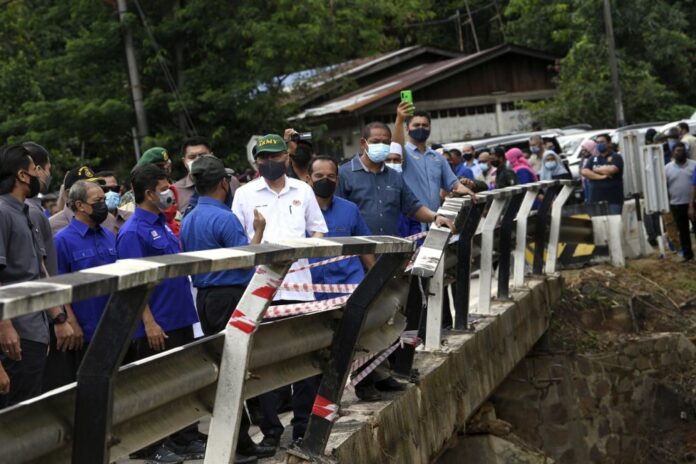Prime Minister Datuk Seri Ismail Sabri Yaakob is pictured during a working visit to flood-hit Merbok in Kuala Muda, Kedah August 23, 2021. — Bernama pic
KUALA LUMPUR, Oct 21 — The National Disaster Risk Reduction Policy being formulated by the National Disaster Management Agency (Nadma) can strengthen management and intensify the nation’s disaster risk preparedness, said Prime Minister Datuk Seri Ismail Sabri Yaakob.
He said that apart from improving the understanding of disaster risks, the policy could also help increase investment in disaster risk reduction initiatives in terms of human resource capacity, institutional empowerment, expansion of mitigation measures and technology applications.
“I have also been informed by the Director-General of Nadma that one of the efforts undertaken by Nadma to provide awareness and understanding to the people on the risks of disasters in Malaysia is through the publication of the National Risk Register (NRR) document for the public,” he said.
He said this when launching the “Disaster Risks in the Era of Climate Change” webinar organised by Nadma, today.
The document, prepared in collaboration with Nadma’s strategic partner, the South East Asia Disaster Prevention Research Initiative (SEADPRI-UKM), will be launched by the Prime Minister next Thursday.
Ismail Sabri said the NRR was a good effort towards making Malaysian families aware of disaster management being undertaken in the country, the types of existing disasters and follow-up actions that could be used as a reference.
The document can also be used for the purpose of planning and mapping studies, monitoring, early forecasting systems, prevention, mitigation and risk reduction strategies.
Meanwhile, the Prime Minister said the disaster risk mitigation strategies, action plans and programmes developed should mainstream disaster risk reduction in all sectors as well as be coherent with global instruments including the Paris Agreement to achieve the Sustainable Development Goals (SDGs).
He said the science and technology approach was also an important step in integrating disaster risk reduction with climate change adaptation.
“In facing the risk of disasters, the well-being of Malaysian families is the key prerequisite, we target people who are always sensitive to disaster risks, have resilience and ability to adapt to disaster situations in this era of climate change,” he said.
The prime minister said the government took seriously the impact of climate change and the increasing toll of disasters in the future, taking into account the Human Cost of Disasters Report 2000-2019 by the United Nations Office for Disaster Risk Reduction (UNDRR).
“This is emphasised in the Main Strategy of the 12th Malaysia Plan (12MP) which is to increase resilience to climate change and disasters towards sustaining the country’s green growth agenda,” he said.
Ismail Sabri said the impact of disasters such as floods, tsunamis and the Covid-19 pandemic could not be avoided, but could be mitigated through the DRR initiative and saw it as an opportunity to be better prepared and resilient to disasters in the future.
“Communication, education and public awareness are the keys that need to be implemented continuously to form a culture of sharing responsibility, including in disaster risk reduction,” he said.
These include experiential learning approaches and encouraging the involvement of young people in public awareness, in turn driving behavior change towards disaster-resilient communities. — Bernama


